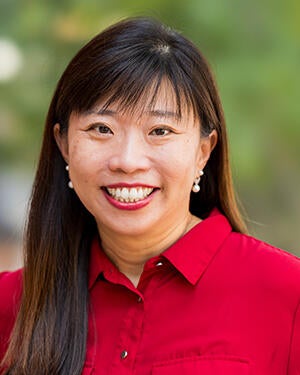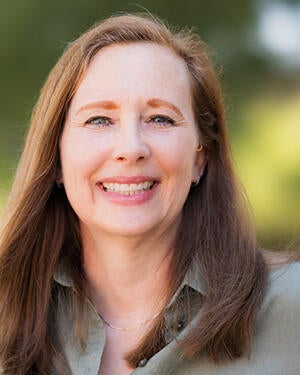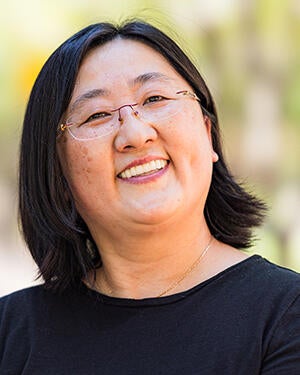Designation as a President's Professor is one of Arizona State University's most prestigious faculty honors. It is designed to reward enthusiasm and innovation in teaching, the ability to inspire original and creative work by students, mastery of subject matter and scholarly contributions. The first class of ASU President's Professors was from 2006. Please click on the year(s) below to read about the accomplishments of these honorees.
2024 President's Professors

Pauline Hope Cheong
Hugh Downs School of Human CommunicationThe College of Liberal Arts and Sciences
Cheong studies the complex interactions between communication technologies and different cultural communities around the world. She believes that invisible yet powerful cultural and communicative forces make up how we interact and organize with digital media, to impact participation and power in society.

Pamela A. Marshall
School of Mathematical and Natural SciencesNew College of Interdisciplinary Arts and Sciences
Marshall uses the power of yeast genetics to study basic cellular biology and applied analysis for rational drug design. She is a senior member of the National Academy of Inventors, for her intellectual property work in rexinoid synthesis and biology.

Teresa Wu
School of Computing and Augmented IntelligenceIra A. Fulton Schools of Engineering
Wu is a professor in industrial engineering program in the School of Computing and Augmented Intelligence and the founding co-director of the ASU-Mayo Center for Innovative Imaging. Her main areas of interests are in health informatics, distributed decision support. She is National Science Foundation CAREER award winner.
Search All
James B. Adams
Ira A. Fulton Schools of EngineeringProfessor Adams believes that a successful undergraduate experience is tied to instruction that reaches far beyond the classroom. He is a professor of materials and the chair of the materials program in the School of for Engineering of Matter, Transport and Energy in the Ira A. Fulton Schools of Engineering. Professor Adams is an excellent teacher who has taught a wide variety of courses, created several courses, and created teaching materials with national impact. He is consistently assigned some of the most difficult/least popular courses to teach, and he consistently turns them into the most popular courses in the curriculum. He is extremely dedicated to undergraduate success, including recruiting, advising, research, and job placement.
Recognized: 2009 | Recognition video
Joni Adamson
The College of Liberal Arts and SciencesRecognized: 2019
Leona S. Aiken
The College of Liberal Arts and SciencesRecognized: 2010 | Recognition video
Ricardo Alarcon
The College of Liberal Arts and SciencesRecognized: 2013 | Recognition video
Janet "Jess" Alberts
The College of Liberal Arts and SciencesRecognized: 2007 | Recognition video
Brad Allenby
Ira A. Fulton Schools of EngineeringRecognized: 2011 | Recognition video
Ariel D. Anbar
The College of Liberal Arts and SciencesRecognized: 2013 | Recognition video
Michael Angilletta
The College of Liberal Arts and SciencesRecognized: 2019
Heather Bimonte-Nelson
The College of Liberal Arts and SciencesRecognized: 2020
James Blasingame
The College of Liberal Arts and SciencesBlasingame’s areas of expertise are young adult literature, indigenous education, secondary writing instruction and the education of pre-service teachers, in addition to cowboy poetry.
Recognized: 2023
Bryan Brayboy
The College of Liberal Arts and SciencesFormer
Educators are most successful when we work with students long enough to get them to do what we do — but better. Whether students pursue work around issues related to my particular areas of specialty is unimportant. What is important is ensuring students know how to ask questions, contextualize issues, and access relevant and reliable information in order to inform their opinions and professional and academic work. I teach students, at all levels, how to navigate the process of becoming an academic and professional. This means helping students understand how to ask meaningful questions, locate those questions within a larger body of literature or contemporary ideas, and find ways to answer their questions.
Recognized: 2014
Alexandra Brewis Slade
The College of Liberal Arts and SciencesRecognized: 2013 | Recognition video
Sara Brownell
The College of Liberal Arts and SciencesBrownell’s research in biology education is internationally recognized. Starting from her education as a neuroscientist, she transitioned to discipline-based education research and is an expert on course-based undergraduate research experiences and making undergraduate science learning experiences, specifically active learning courses and undergraduate research experiences, more inclusive.
Recognized: 2023
Randall S. Cerveny
The College of Liberal Arts and SciencesRecognized: 2006 | Recognition video
Alice A. Christie
Mary Lou Fulton College for Teaching and Learning InnovationEmeritus
Recognized: 2006 | Recognition video
Richard Creath
The College of Liberal Arts and SciencesRecognized: 2010 | Recognition video
Eileen Díaz McConnell
The College of Liberal Arts and SciencesRecognized: 2020
Lara Ferry
New College of Interdisciplinary Arts and SciencesRecognized: 2018
Jennifer Fewell
The College of Liberal Arts and SciencesRecognized: 2012 | Recognition video
Ian R. Gould
The College of Liberal Arts and SciencesRecognized: 2006 | Recognition video
Sharon Jae Hall
The College of Liberal Arts and SciencesRecognized: 2022 | Recognition video
Mark Henderson
Ira A. Fulton Schools of EngineeringEmeritus
Recognized: 2015 | Recognition video
Keith Hjelmstad
Ira A. Fulton Schools of EngineeringRecognized: 2018
Pauline Hope Cheong
Hugh Downs School of Human CommunicationThe College of Liberal Arts and Sciences
Cheong studies the complex interactions between communication technologies and different cultural communities around the world. She believes that invisible yet powerful cultural and communicative forces make up how we interact and organize with digital media, to impact participation and power in society.
Recognized: 2024
Ted Humphrey
The College of Liberal Arts and SciencesEmeritus
Recognized: 2007 | Recognition video
Glenn H. Hurlbert
The College of Liberal Arts and SciencesEmeritus
Recognized: 2012 | Recognition video
Matthias Kawski
The College of Liberal Arts and SciencesRecognized: 2015 | Recognition video
Douglas Kenrick
The College of Liberal Arts and SciencesRecognized: 2018
Eric Kostelich
The College of Liberal Arts and SciencesRecognized: 2011 | Recognition video
Manfred Laubichler
The College of Liberal Arts and SciencesRecognized: 2011 | Recognition video
Cynthia Lietz
Watts College of Public Service and Community SolutionsRecognized: 2020
Jane Maienschein
The College of Liberal Arts and SciencesRecognized: 2007 | Recognition video
Pamela A. Marshall
School of Mathematical and Natural SciencesNew College of Interdisciplinary Arts and Sciences
Marshall uses the power of yeast genetics to study basic cellular biology and applied analysis for rational drug design. She is a senior member of the National Academy of Inventors, for her intellectual property work in rexinoid synthesis and biology.
Recognized: 2024
Ian Moulton
College of Integrative Sciences and ArtsRecognized: 2020
José E. Náñez Sr.
New College of Interdisciplinary Arts and SciencesDeceased
Recognized: 2008 | Recognition video
Margaret C. Nelson
The College of Liberal Arts and SciencesRecognized: 2008 | Recognition video
Mary Bates
Herberger Institute for Design and the ArtsRecognized: 2015 | Recognition video
Ileana Alexandra Orlich
The College of Liberal Arts and SciencesRecognized: 2012 | Recognition video
Amy L. Ostrom
W. P. Carey School of BusinessRecognized: 2010 | Recognition video
Kaye Reed
The College of Liberal Arts and SciencesRecognized: 2014
Steve Reynolds
The College of Liberal Arts and SciencesRecognized: 2018
Paul D. Rothstein
Herberger Institute for Design and the ArtsDeceased
Recognized: 2006 | Recognition video
Andrew T. Smith
The College of Liberal Arts and SciencesEmeritus
Professor Smith believes it is possible to change the world, and so do his undergraduate students. He is a professor of conservation biology, population biology and mammalogy in the School of Life Sciences, The College of Liberal Arts and Sciences. He has been the leader of the conservation biology program for over three decades and has successfully built the program based on his internationally recognized research, mentorship of graduate students, and through his dedicated support of undergraduate education. He worked to develop new courses, recruit new faculty and support staff to actively embrace undergraduate students and their goals. He has served as the Chair of the IUCN Species Survival Commission Lagomorph Specialist Group and as an advisor to the Chinese government on issues concerning biodiversity.
Recognized: 2009 | Recognition video
Thomas G. Sugar
Ira A. Fulton Schools of EngineeringRecognized: 2022 | Recognition video
Max Underwood
Herberger Institute for Design and the ArtsRecognized: 2008 | Recognition video
Andréa Werneck Richa
Ira A. Fulton Schools of EngineeringRecognized: 2022 | Recognition video
Teresa Wu
School of Computing and Augmented IntelligenceIra A. Fulton Schools of Engineering
Wu is a professor in industrial engineering program in the School of Computing and Augmented Intelligence and the founding co-director of the ASU-Mayo Center for Innovative Imaging. Her main areas of interests are in health informatics, distributed decision support. She is National Science Foundation CAREER award winner.
Recognized: 2024
Amber Wutich
The College of Liberal Arts and SciencesRecognized: 2018